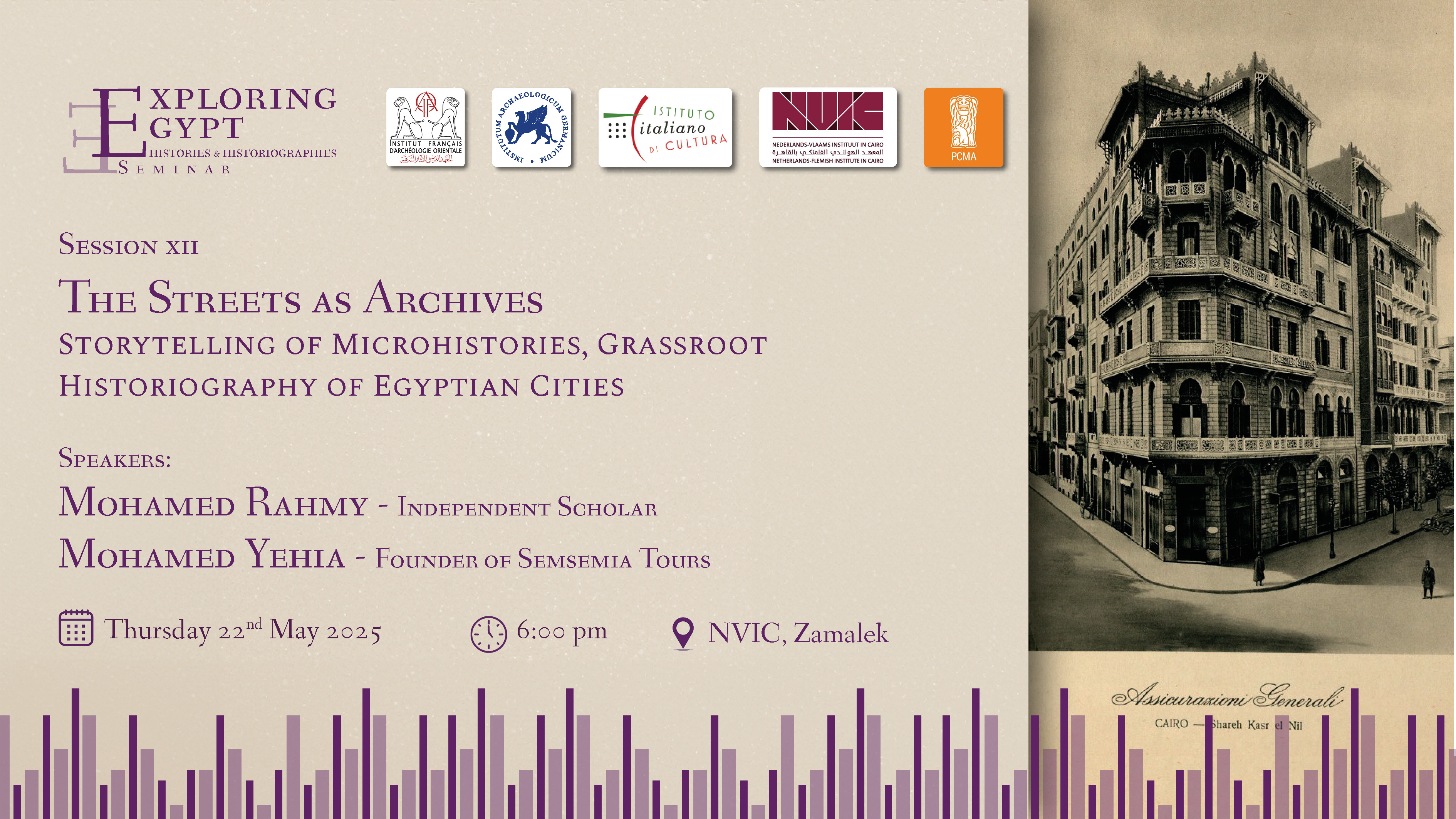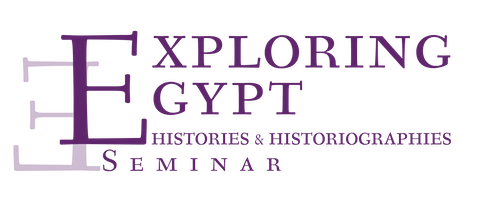Manifestations scientifiques
Abonnez-vous à la … Subscribe to the Mailing list :

Exploring Egypt Seminar: Histories and Historiographies
Le jeudi 22 mai 2025 à 18h00 (heure du Caire), NVIC 
The Streets as Archives
Storytelling of Microhistories, Grassroot Historiography of Egyptian Cities
Langue : anglais.
The 12th session of the seminar series 'Exploring Egypt: Histories and Historiographies', a joint initiative of the Ifao, DAIK, CAI, PCMA & NVIC, will be hosted at the NVIC, Zamalek. This session features Mohamed Rahmy and Mohamed Yehia, and it is entitled "The Streets as Archives: Storytelling of Microhistories, Grassroot Historiography of Egyptian Cities". The lecture is open to the public in the limit of available places.
Abstract:
In their research, both Mohamed Rahmy and Mohamed Yehia work with the streets; the built environment is the focal point of many of the stories they relay through different mediums on the urban histories of Egyptian cities. The streets are their archives embodying -both directly and indirectly- the historic knowledge that informs the narratives they produce. Through their work, and by deploying these bottom-up approaches, microhistories of people and places are therefore created, introducing novel ways of understanding and engaging with Egypt’s past. Their work highlights the considerable potential of public history, its research, accessibility and its outreach to the wider audience, with and for the local communities.
Mohamed Yehia is an independent historian, educator, and founder of Semsemia Tours. He holds an MA in History from SOAS, University of London, and his research focuses on labor and urban history as well as social‐sciences education in Egypt. Mohamed has participated in several initiatives across the Nile Delta and the Suez Canal Zone aimed at promoting public history and humanities education. In addition to his academic work, Mohamed channels his passion for history and culture into educational tourism. Through Semsemia Tours, he curates immersive experiences that invite travelers to explore Egypt’s rich historical landscapes and engage with the vibrant cultural life of its provincial towns.
Mohamed Rahmy is a mid-career professional with two-decades of work experience. Originally a banker and an economist with some of the region’s most prestigious financial institutions, after completing his postgraduate studies back in 2012, he’s made a transition to the nonprofit sector where he’s since held leadership roles in the entrepreneurship-enablement and youth-empowerment spaces in Egypt and regionally. Outside of his professional pursuits, Rahmy is intellectually curious about all matters Middle East-related, particularly the economy, business, and the region’s entrepreneurship tradition. He’s passionate about urban heritage and actively uses social media (urbanyzie_) to raise awareness about Egypt’s rich legacy of modern built heritage. Rahmy holds a BA in Economics from AUC (’03) and an MA in Near and Middle Eastern Studies from SOAS (’12).

Exploring Egypt Seminar: Histories and Historiographies
A joint collaboration between the Ifao (Institut français d’archéologie orientale) & the DAIK (German Archaeological Institute in Cairo), joined in 2025 by the CAI (Centro Archeologico Italiano), PCMA (Polish Centre of Mediterranean Archaeology Cairo), NVIC (Netherlands-Flemish Institute in Cairo) and ARCE (American Research Center in Egypt).
This seminar series aims, broadly speaking, to discuss different aspects related to the production of historical knowledge on Egypt. Speakers are invited to reflect on the different ways of writing, narrating and thinking about Egypt’s history at different periods, as well as on the actors, contexts, and power relations involved in the production of historical narratives. By adopting an interdisciplinary perspective, the seminar series seeks to bring into conversation fields which have traditionally been examined separately, such as the history of Egyptology, the study of modern Egyptian historiography, and the history of heritage and preservation.
In addition, while the seminar series seeks to shed a critical light on the formation of specific disciplinary fields and traditions, it also moves beyond an exclusive focus on professional history writing, in order to explore the various institutions, genres, and channels, through which historical narratives have been produced and disseminated. Among the themes that will be discussed, for instance, are the different “histories” of Egyptology, archaeology or Arabic and Islamic studies, academic versus “popular” representations of history, and heritage preservation as a site of production of historical narratives.
Exploring Egypt: Histories and Historiographies Seminar is organised by Fatma Keshk, Postdoctoral fellow at DAIK & Ifao and Malak Labib, scientific member of the Ifao.

